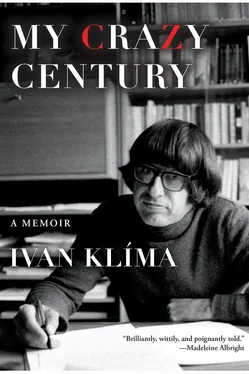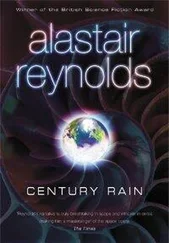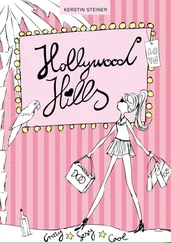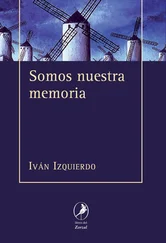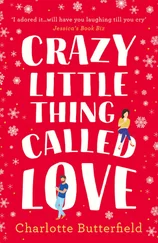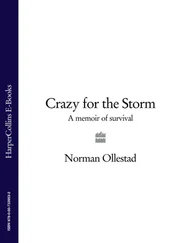Two of Mother’s brothers were meant to study law, but they went into politics instead. I hardly knew them and can’t judge whether they joined the Communist Party out of misguided idealism or genuine solidarity with the poor, who at that time still made up a sizable portion of the population. After having immigrated to the Soviet Union, both of them returned to the German-occupied Protectorate of Bohemia and Moravia on orders from the party. Given their Jewish background, this was a suicidal move and certainly not opportunistic.
My mother was fond of her brothers and respected them, but she did not share their convictions. It bothered her that the Soviet Union meant more to them than our own country and that they held Lenin in higher esteem than they did Tomáš Garrigue Masaryk.
On the day I turned six, Masaryk died. For my birthday, my mother promised me egg puffs, which were an exceptional treat. To this day I can see her entering the room with a plateful of the pastries and sobbing loudly, the tears running down her beautiful cheeks. I had no idea why; it was my birthday, after all.
Father seldom spoke about his childhood. He seldom spoke to us about much of anything; he would come home from work, eat dinner, sit down at his worktable, and design his motors. I know that he lost his father when he was thirteen. Grandmother was able to get by on her husband’s tiny pension only because her brother-in-law (our only wealthy relative) let them live rent-free in a little house he bought for them just outside Prague. When he was studying at the university, my father supported himself by giving private lessons (as did my mother), but then he got a decent job in Kolbenka and managed to hang on to it even during the Depression. Still, I think the mass unemployment that affected so many workers influenced his thinking for a long time afterward.
I hadn’t yet turned seven when the country mobilized for war. I didn’t understand the circumstances, but I stood with our neighbors at the garden gate and watched as columns of armored cars and tanks rolled by. We waved to them while airplanes from the nearby Kbely airport roared overhead. Mother burst out crying and Father railed against the French and the English. I had no idea what he was talking about.
Soon after, we moved across town to Hanspaulka. Our new apartment seemed enormous; it had three rooms and a balcony and a large stove in the kitchen. When the stove was fired up, hot water flowed into strange-looking metal tubes that Father called radiators, although they bore no resemblance to the radio from which human voices or music could be heard. It was in this new apartment that my brother, Jan, was born. The name Jan is a Czech version of the Russian Ivan, so if we had lived in Russia our names would have been the same.
When Father brought Mother and the newborn home from the maternity hospital, there was a gathering of both our grandmothers, our grandfather, and our aunts, and they showered praises on the infant, who, in my opinion, was exceptionally ugly. I recall one sentence uttered by Grandfather when they gave him the baby to hold: “Well, little Jan,” he said, “you haven’t exactly chosen a very happy time to be born.”
*
Until then I had never heard the word “Jew,” and I had no idea what it meant. It was explained to me as a religion, but I knew nothing about religion: My school report card stated “no religious affiliation.” We had the traditional visitation from Baby Jesus at Christmas, but I had never heard anything about the Jesus of the Gospels. Because I had been given a beautiful retelling of the Iliad and the Odyssey , I knew far more about Greek deities than I did about the God of my ancestors. My family, under the foolish illusion that they would be protecting my brother and me from a lot of harassment, had us christened. Family tradition had it that some of my mother’s distant forebears had been Protestants, and so my brother and I were christened by a Moravian church pastor from Žižkov. I was given a baptismal certificate, which I have to this day, but I still knew nothing of God or Jesus, whom I was meant to believe was God’s son and who, through his death on the cross, had liberated everyone — even me — from sin and death.
Father may have been upset with the English, but one day my parents informed me that we were going to move to England. I was given a very charming illustrated textbook of English called Laugh and Learn, and Mother started learning English with me.
I asked my parents why we had to move out of our new apartment that all of us were fond of. Father said I was too young to understand, but he’d been offered a good job in England, and if we stayed here, everything would be uncertain, particularly if we were occupied by the Germans, who were ruled by, he said, an upholsterer, a good-for-nothing rascal by the name of Hitler.
One snowy day the Germans really did invade the country.
The very next morning complete strangers showed up at our apartment speaking German — or, more precisely, shouting in German. They walked through our beautiful home, searched the cupboards, looked under the beds and out on the balcony, and peered into the cot where my little brother began crying. Then they shouted something else and left. I wanted to know who these people were and how they could get away with storming through our apartment as though they owned it. Mother, her face pale, uttered another word I was hearing for the first time: gestapo . She explained that the men were looking for Uncle Ota and Uncle Viktor. She lifted my brother from his cot and tried to console him, but as she was so upset, her efforts only made Jan cry harder.
At dinner, Father told Mother it was time to get out. But in the end, we didn’t move to England because, although we already had visas, Grandmother’s had yet to arrive. To make matters worse, our landlord, Mr. Kovář, served us with an eviction notice. He didn’t want Jews in his building anymore. Naturally no one told me anything, and I still had no idea that I was so different from other people it might give them a pretext to kill me.
We moved into a newly completed building in Vršovice, where again we had only two rooms. Immediately after that, the war began.
I can no longer recall exactly how that apartment was furnished. I vaguely recollect a green ottoman, a bookcase on which an azure blue bowl stood, and, hanging on the living room wall, a large map of Europe and northern Africa where Father followed the progress of the war. Apparently it was not going well. The German army swiftly occupied all those colored patches on the map representing the countries I had learned unerringly to recognize: the Netherlands, Belgium, France, Denmark, Norway, Yugoslavia. To top it all off, the good-for-nothing rascal Hitler had made an agreement with someone called Stalin, who ruled over the Soviet Union, decreeing that their respective empires would now be friends. This news took Father by surprise. I also understood that it was a bad sign, since the area on the map marked Soviet Union was so enormous that if the map was folded over, the Soviet Union could completely cover the rest of Europe.
When we first moved into our new home, there were lots of boys and girls to play with. Our favorite game was soccer, which I played relatively well, followed by hide-and-seek because there were many good hiding places in the neighborhood.
Then the protectorate issued decrees that banned me from going to school, or to the movies, or into the park, and shortly thereafter I was ordered to wear a star that made me feel ashamed because I knew that it set me apart from the others. By this time, however, Germany had attacked the Soviet Union. At first Father was delighted. He said that it would be the end of Hitler because everyone who had ever invaded Russia, even the great Napoleon himself, had failed, and that had been long before the Russians had created a highly progressive system of government.
Читать дальше
